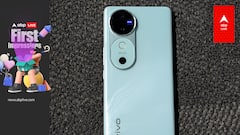Mark Zuckerberg Unveils New AI Products At Meta Connect Conference: All You Need To Know
Zuckerberg announced that the new generation of Meta's Ray-Ban smart glasses would commence shipping on October 17, priced at $299.

In a significant move merging the virtual and real worlds, Meta Platforms Chief Executive Mark Zuckerberg introduced a range of new AI products during the Meta Connect conference, the company's major annual event and first in-person conference since the pandemic. These innovations include bots capable of generating photo-realistic images and smart glasses designed to answer user queries, alongside an updated virtual-reality headset.
Zuckerberg emphasised the ability of these products to seamlessly integrate into daily routines, underlining Meta's commitment to offering low-cost or free AI solutions. Meta's VR bestseller, Quest, was lauded as the best value in the VR industry, contrasting with the imminent release of a more expensive headset by Apple.
Speaking from Meta's sprawling Silicon Valley campus, Zuckerberg announced that the new generation of Meta's Ray-Ban smart glasses would commence shipping on October 17, priced at $299. These glasses will feature a new Meta AI assistant and enable live streaming directly to Facebook and Instagram, enhancing the previous generation's photo-capturing abilities.
Moreover, the latest Quest mixed-reality headset is set to ship on October 10, introducing Meta's first consumer-facing generative AI products. Among these is "Meta AI," a chatbot capable of generating both text responses and photo-realistic images. Zuckerberg emphasised the company's innovation ethos, ranging from groundbreaking inventions to making high-end technology affordable for everyone.
ALSO READ: Apple Vision Pro Is Impressive, But Widespread Adoption Will Take Few Years: Analysts
Meta AI will serve as an assistant in the smart glasses, starting with a beta rollout in the United States. A forthcoming software update in the next year will equip the assistant with the ability to identify places and objects and perform language translation.
Meta developed Meta AI using a custom model based on the robust Llama 2 large language model, released for public commercial use in July. The chatbot will have real-time information access through a partnership with Microsoft's Bing search engine.
In an interview with Reuters, Meta Global Affairs President Nick Clegg highlighted measures taken to filter private details from the training data and restrictions imposed on the tool to prevent the creation of realistic images of public figures.
Meta also revealed plans to create a platform enabling developers and users to design custom AI bots, providing them profiles on Instagram and Facebook and eventually integrating them into the metaverse as avatars.
The announcements largely focused on enhancing existing apps and devices rather than introducing new revenue streams. "I don't see monetisation of AI products happening for Meta for quite some time, and I think it will end up being more indirect. They seem much more interested in helping develop a platform that other developers will use," remarked Bob O'Donnell, chief analyst at TECHnalysis Research.
Zuckerberg also announced that Xbox cloud gaming would be available on Quest starting in December. These developments highlight Zuckerberg's strategy in the face of the current shift of investor interest from augmented and virtual reality to artificial intelligence technologies.
The event's significance was underscored by last year's investor scrutiny of Meta for heavy spending on the metaverse, prompting layoffs to continue funding their vision. Developers and investors alike eagerly awaited insights into potential apps for Meta's latest hardware and signs of a promising future for the company.
Related Video
Apple creates a new record in iPhone sales after launch of iPhone 16 | ABP Paisa Live





































